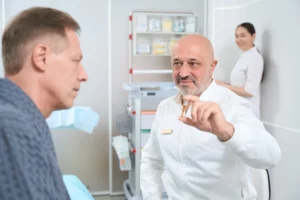Like it or not, your mental health affects your sex life–it’s an important connection to understand. In fact, the relationship between sex and mental health is so strong that it can be difficult to separate them entirely. What does this mean for you? Well, if you’re not sure how to improve your sexual wellness or if you’re having trouble enjoying sex as much as you used to, then there may be something going on with your mental health that could be impacting both of these things—and vice versa! Read on to learn more about how mental health problems can negatively impact your sexual well-being and how online hormone replacement therapy may be able to help.
Connection Between Anxiety and Erectile Dysfunction
Anxiety is a normal and natural part of life. It’s how we feel about something that can cause us stress, ranging from the little things like making a call or asking for help to the big things like starting a new job. Anxiety has its upsides: it warns us when something’s not right and may even help us focus on our goals and prepare for upcoming events. But when anxiety becomes overwhelming and interferes with everyday life. This is called an anxiety disorder—and it can have serious consequences for your sexual health.
Anxiety disorders affect nearly 40 million adults in America alone—more than the number affected by heart disease, diabetes and cancer combined! And when anxiety takes over your body and mind without any warning signs (such as sweating), you may find yourself struggling to perform sexually. Performance anxiety and generalized anxiety are both frequent causes of erectile dysfunction (ED); an estimated 9-25% of men suffer from sexual performance anxiety. This inability to perform can cause anxiety to increase further, creating a vicious cycle that’s difficult to break without assistance.

Connection Between Depression and Low T
Clinical depression can cause a range of sexual issues for both men and women, including ED, impotence, and low testosterone in men. People with depression also typically experience a loss of interest in activities they once enjoyed, including sex. Low testosterone can also effect your sex and mental health. Depression symptoms are common among those with low testosterone, though researchers are currently unsure of what causes the correlation.
Online hormone replacement therapy has been shown to improve mood and energy, as well as sexual function in men with low testosterone. Testosterone can also help with weight loss, bone health and more. When you feel good about yourself and your life (both mentally and physically), it’s easier for you to maintain an active sex life. If you’re suffering from depression or other mental health issues, improving those areas may lead to better sexual wellness in the long run.
Connection Between PTSD and Sexual Wellness
It’s common for people with PTSD to experience symptoms of sexual dysfunction. Men who have experienced trauma may exhibit erectile dysfunction, low sperm count, low libido, and more. These problems can be caused by the way trauma impacts the brain.
When someone experiences a traumatic event, their brain goes into fight-or-flight mode to protect them from further harm. While this is an involuntary response—and necessary for survival—it sometimes has unintended consequences. The body releases adrenaline during a traumatic event that causes blood pressure to rise, heart rate increase, and even more oxygenated blood flow to muscles in preparation for fighting or fleeing danger (elevating testosterone levels). The same overactive hormones and neurons that are associated with PTSD are also connected to sexual activity, which means that arousal can sometimes lead to anxiety and fear.
Connection Between Mental Health and Sex
Sex and mental health are linked in a number of ways. We mentioned anxiety, depression, and PTSD above, but a range of mental health issues can impact sexual wellness. These can include ADHD, eating disorders, substance abuse, and more. But, the link between mental and sexual wellness goes both ways. For men who have trouble getting an erection, experience premature ejaculation, or have other sexual problems, these issues can cause negative moods, anxiety, low self-esteem, and other mental health related issues.
If you’re experiencing depression or other mood disorders that affect your sexuality, it’s important to seek help from a mental health professional and a sexual health professional. These two issues should be treated in tandem. They’ll be able to provide strategies for dealing with the issue so that you can enjoy healthier sexual experiences in the future.
Can Hormone Replacement Therapy Help Improve Mental and Sexual Health?
Testosterone is a hormone that plays a role in both sexual and mental wellness. It’s responsible for your sex drive (libido), hair growth, muscle mass, and sperm production. T levels naturally decrease with age, which can lead to symptoms like low energy and depression. Testosterone replacement therapy (TRT) helps address these symptoms by providing you with additional testosterone so you can be at your best. Online hormone replacement therapy can:
- Improve sexual satisfaction
- Boost self-esteem
- Decrease irritability and moodiness
- Increase energy
- Alleviate some symptoms of mental health issues
- Boost quality of life overall
Hormones affect your sexual wellness, and so does your mental state. Hormone replacement therapy is a treatment option to treat low testosterone in men, which may have an impact on your mental health. Low testosterone levels can cause symptoms like depression and anxiety, which can in turn decrease sexual wellbeing. If you’re experiencing these symptoms and want to take steps toward improving your sexual wellness and overall well-being, talk with a doctor about all of your options. In some cases, hormone replacement therapy may be helpful for treating low testosterone levels, increasing sexual wellness, and alleviating the symptoms of some mental health problems.
In conclusion, the connection between sex and mental health is clear. You can use online hormone replacement therapy to improve both your mental health and sexual well-being, but it’s important to understand that it won’t fix everything on its own. If you have any questions about how hormone replacement therapy could help improve your overall wellness, please contact us today!













One Response